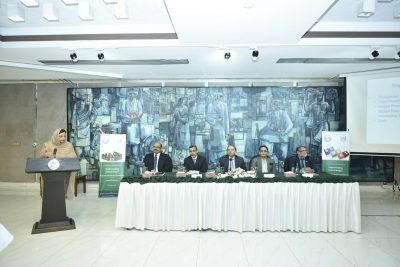
On Wednesday, June 11, 2025, the Pakistan Institute for Parliamentary Services (PIPS) organized a knowledge-sharing session titled “Understanding Federal Budget: Analysis and Recommendations” at the Banquet Hall, Senate Secretariat, Islamabad. The session was specifically curated for Honourable Senators with the aim of enhancing their capacity to comprehend key budget documents, analyze sectoral allocations and budgetary trends, and formulate well-informed, technically sound recommendations during the Senate’s budget debate and the deliberations of the Finance Committee.
The session commenced with programme overview by Ms. Samer Awais, Director General (PDP & C), PIPS. On behalf of PIPS, she warmly welcomed the Hon’ble Chairperson Senate Standing Committee on Finance and Revenue, Senator Saleem Mandviwalla, Honourable Senators, distinguished facilitators, and officials from the Senate Secretariat. She provided a brief overview of the agenda and invited Mr. Rana Obaid Ullah Anwar, Joint Secretary (Budget), Finance Division, to deliver the first technical briefing.
Mr. Rana Obaid Ullah Anwar provided a comprehensive presentation on the preparation of the federal budget, with a particular focus on the structure and classification of core budget documents and key terminologies. He emphasized that the Annual Budget Statement is a constitutional obligation and that the Finance Division holds the primary responsibility for ensuring timely fund availability. He also clarified that the implementation phase of the budget begins on July 1 each year, immediately following its approval.
The next session was led by Dr. Wasim Shahid Malik, Fiscal Risk Management Expert at the Asian Development Bank, who focused on sectoral budget analysis. Dr. Malik stressed that government policy frameworks must be aligned with the public interest and broader development goals. He identified erratic rainfall patterns as a significant contributor to underperformance in the agricultural sector and pointed out the absence of GDP growth projections in the Federal Budget for FY 2025–26, marking it as a critical gap in fiscal planning.
Honourable Senator Saleem Mandviwalla delivered a detailed presentation comparing general versus specific recommendations for the federal budget. The session was supported by Ms. Iffat Mustafa, Director General (Coordination/Research), Senate Secretariat, who elaborated on the legislative mandate of the Senate Standing Committees under Rule 166(7) of the Senate Rules. She highlighted that each Committee is responsible for reviewing the proposed Public Sector Development Programme (PSDP) of its corresponding Ministry and submitting its recommendations to the Ministry of Finance before the finalization of the Federal Budget. Senator Mandviwalla emphasized that the capacity to make meaningful and actionable recommendations is vested not only in Committee Chairs but in all members of the Senate. He underscored the vital role of Parliament in shaping a federal budget that is inclusive, effective, and reflective of public needs. Citing Rule 130(1) and Rule 130(2) of the Rules of Procedure and Conduct of Business in the Senate (2012), he noted that the Minister for Finance and Revenue is required to move that the Senate may make recommendations to the National Assembly, and that members may submit these recommendations within three days of the motion, accompanied by a statement of reasons. Additionally, Senator Mandviwalla reflected on the historical performance of the Senate Standing Committee on Finance and Revenue during previous budget sessions, identifying areas of strength and scope for improvement. Numerous queries raised by participants were addressed by the facilitators, contributing to a robust and informative session.
The session concluded with a formal vote of thanks delivered by Ms. Mariam Ahsan, Deputy Director (PDP), PIPS.